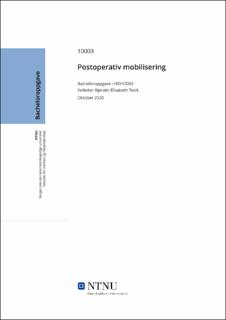| dc.contributor.advisor | Tevik, Kjerstin Elisabeth | |
| dc.contributor.advisor | Nakrem, Sigrid | |
| dc.contributor.author | Markiewicz, Emilie | |
| dc.date.accessioned | 2021-09-25T16:19:57Z | |
| dc.date.available | 2021-09-25T16:19:57Z | |
| dc.date.issued | 2020 | |
| dc.identifier | no.ntnu:inspera:65714253:6059978 | |
| dc.identifier.uri | https://hdl.handle.net/11250/2782775 | |
| dc.description.abstract | Sammendrag
Tittel: Postoperativ mobilisering
Hensikt: å belyse om bruk av ERAS-protokollen kan bidra til å forebygge postoperative komplikasjoner ved hjelp av tidlig mobilisering, samt belyse utfordringene som forhindrer mobilisering for sykepleier og pasient.
Problemstilling: Hvordan kan sykepleier ved bruk av ERAS protokoll og tidlig mobilisering forebygge postoperative komplikasjoner hos gastrokirurgiske pasienter?
Metode: Oppgaven er litteraturstudie, og bygger på forskningsartikler og faglitteratur. Oppgaven knyttes til Virginia Hendersons grunnleggende behovsteori og sykepleiers funksjon.
Resultat: Hovedfunnene viser at god etablering av ERAS-protokollen, tidlig mobilisering, god smertelindring og informasjon forebygger postoperative komplikasjoner. De viser også utfordring med ressursbruk og tid. Pasientgruppen har og økende utfordringer for å lykkes med ERAS protokollen som høy alder og komorbiditet.
Konklusjon: Sykepleieutøvelsen er sentralt i utførelsen av ERAS-protokollen og pasientpleie, men krever god kunnskap og organisering, samt mer forskning på sykepleieaspektet. Forskning viser at ERAS-protokollen fungerer i forebygging av postoperative komplikasjoner.
Nøkkelord: Sykepleie, ERAS, forebygging, postoperative komplikasjoner, gastrokirurgiske pasienter, tidlig mobilisering | |
| dc.description.abstract | Abstract
Title: Postoperative mobilization
Purpose: To illuminate the use of ERAS-protocol that can help prevent postoperative complications with use of early mobilization. Also As highlighting the challenges that prevent mobilization for nurses and patients.
Research question: How can nurses using ERAS protocol and early mobilization, prevent postoperative complications in gastric surgery patients?
Method: The thesis is a literature study and is based upon research articles and subject literature. The thesis is linked to Virginia Henderson´s basic needs theory and the nurse´s function.
Results: The main findings show that god establishment of the ERAS-protocol, early mobilization, god pain relief and information prevents postoperative complications. They also show the challenge of resource use and time, and that the succession of the ERAS-protocol highly depends on variable factors such as; old age and comorbidity
Conclusion: The practice of nursing is central in the implementation of the ERAS-protocol and patient care, but it requires good knowledge and organization, as well as more research on the nursing aspect. Research shows that the ERAS-protocol works in the prevention of postoperative complications.
Key words: Nurse, ERAS, prevention, postoperative complications, gastric surgery patients, early mobilization. | |
| dc.language | | |
| dc.publisher | NTNU | |
| dc.title | Postoperativ mobilisering | |
| dc.type | Bachelor thesis | |
